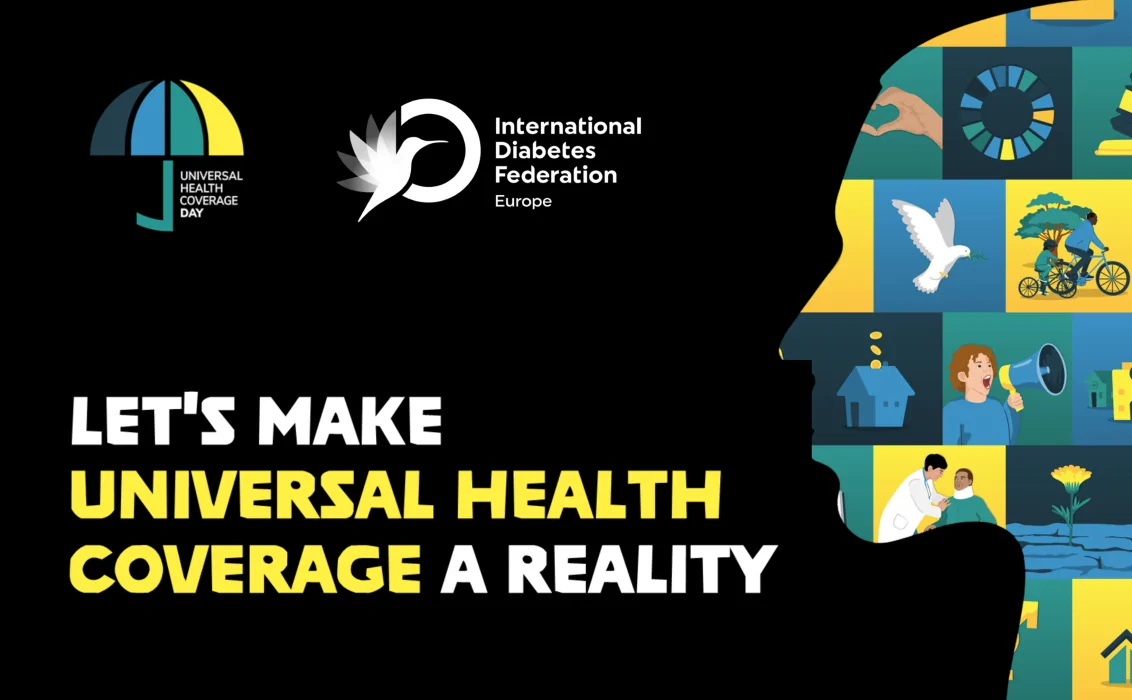European Patients’ Rights Day, 10 May: Newspiece and Webinar
Most people with diabetes in Europe face some barriers in accessing healthcare and to adequately manage their condition. The European continent is vast and diverse, and so are the daily difficulties met by patients. For example, the availability and the affordability of medicines and medical devices are unfortunately still disparate. If new technologies are quickly modifying the daily management of diabetes, the difference in their access within a country and across the continent increases discrimination among patients. Also, as most healthcare systems are still not built around the patients and do not meet the needs of different groups in the population, living with diabetes is still a challenge for many patients in Europe.
On European Patients’ rights day, we spoke to Professor Iryna Vlasenko, IDF Board member from Ukraine and a strong defender of patients’ rights and access to care. Iryna was diagnosed with diabetes 23 years ago; she is an active member of the Ukrainian Diabetic Federation since 2003 and is a member of the Public Council of the Ukrainian Ministry of Health.

The role of pharmacists and pharmacies is very important at several stages of the management of diabetes – not only when medicines are delivered. Unfortunately this resource is underused. Every patient should have the right to access good quality pharmaceutical care; since my involvement in the Ukrainian Diabetes Federation, I have fought to change the situation. During my ten years as a pharmacist in the pharmaceutical department of Kiev’s municipality, we have established a delivery system of insulin through the various pharmacies in Kiev, which helps the communication between doctors who are treating patients and prescribing insulin, and pharmacies, which also provide proper storage facilities.
In 2003, I initiated the organisation of World Diabetes Day (WDD) celebration activities in many pharmacies in Kiev. Since then, on WDD pharmacies highlight information about the risk linked to diabetes and help us promote awareness of the condition. People can check, free of charge, their blood sugar and consult an endocrinologist at the pharmacy. We have also trained pharmacists on diabetes care, a service now available across Ukraine. Since 2010 I have been working for the National Medical Academy on Post-Graduate Education and as teacher of practical pharmacy. In that role, I have managed to strengthen the knowledge of pharmacists on pharmaceutical care for people with diabetes.
I am convinced that pharmacies represent a great potential resource to improve public health and we have to work with them to improve the life of people with diabetes. We should use pharmacies more to raise awareness on diabetes prevention, to promote healthy life style and also to detect diabetes.
Access to medicine is very diverse in Europe and in many countries lack of access to affordable insulin remains a key impediment to successful treatment, resulting in needless complications and premature deaths. This is not acceptable. The message to governments must be clear: if people with diabetes can access proper treatments, self-management and control, their life is closer to the ordinary life of a person without diabetes. They can work, which is beneficial to society. Therefore, the cost of quality medical care for patients is an investment that will improve the life of people with diabetes and positively impact society.
Even when medicines are available, they are not always affordable, causing financial hardship to patients. As a diabetes community, how can we ensure that in Europe no one lacks affordable healthcare to manage their diabetes?
In Europe there are about 60 million people with diabetes and the prevalence is rising everywhere and among all age groups. This is mostly due to an ageing and sedentary population with unhealthy eating habits and diets which lead to overweight and obesity. It is often people with low incomes which are impacted the most by diabetes and its financial burden. We must do something to protect them – this is the goal of universal health coverage: to ensure that all people obtain the health services they need without suffering financial hardship when paying for them. I am glad that this principle has been included in the Sustainable Development Goals of the United Nations. We must work together to implement this principle everywhere in Europe and ensure that care for diabetes is included in the basket of care, otherwise people with diabetes will be financially discriminated because of their condition.
The majority of European countries have adopted diabetes national policies, policies addressing unhealthy diet and physical inactivity as well as national guidelines or standards for diabetes management – this is great. However, implementation and funding of these policies and guidelines are uneven throughout the continent. Furthermore, basic technologies for early detection, diagnosis and monitoring of diabetes in primary care settings are generally still not available in low-income and lower middle-income countries. Things must changes in this respect, too.
Today is European Patients’ rights day. While patients should be at the center of healthcare systems, most of the time these systems are built around healthcare professionals, leaving patients outside the decision-making process. As a diabetes community, what can we do to change this paradigm?
The situation is slowly changing and patients have an increased access to information, including evidence-based medicine. Patients are no longer inclined to merely accept prescribed treatment: they want to receive more explanations and useful information to improve their life. I will give you an example: young people with diabetes communicate via social networks and have access to a large volume of information, including real life examples. In addition, they often know technology much better than the doctors. Therefore, healthcare professionals should constantly improve their professional knowledge and adapt it to today’s real life. As patient organizations, we can help improve the communication between multidisciplinary groups (doctors, nurses, pharmacists and educators) but we must make sure that they listen to their patients and that patients are at the center of the healthcare systems. Education for self-management is also very important and health stakeholders need to find ways to motivate people to take care of their health. Youth summer camps, camp for adults, sports competitions such as DiaEuro are great examples and inspiration.
I am a fighter, and the battle for the rights of patients including access to care for everyone, continues. We must be together in this struggle because together we are stronger!



